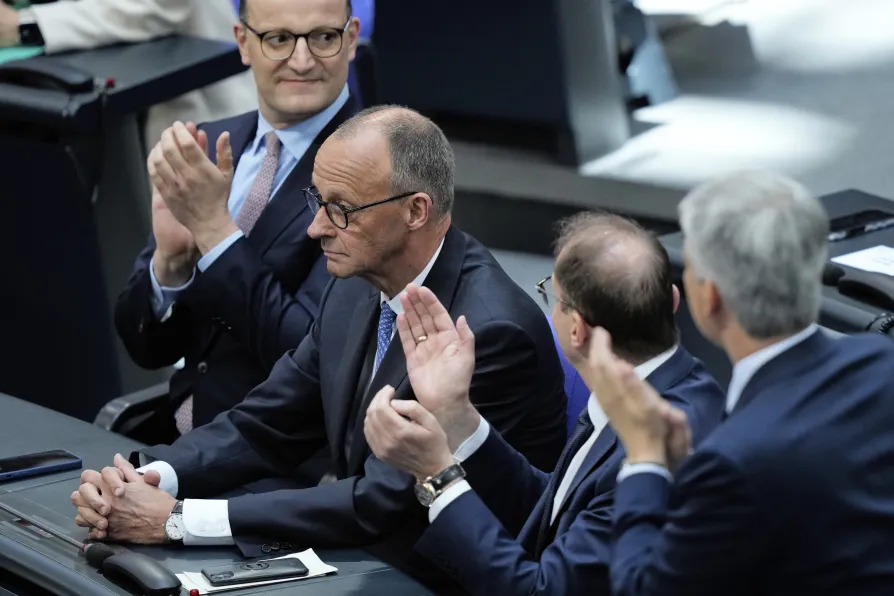
 Leader of the Christian Democrats Friedrich Merz is applauded after being elected new chancellor at the German federal parliament, Bundestag, at the Reichstag building in Berlin, Germany, May 6, 2025
Leader of the Christian Democrats Friedrich Merz is applauded after being elected new chancellor at the German federal parliament, Bundestag, at the Reichstag building in Berlin, Germany, May 6, 2025
FRIEDRICH MERZ succeeded today in his bid to become the next German chancellor during a second vote in parliament, hours after he suffered a historic defeat in the first round.
The right-wing leader had been expected to smoothly win the vote to become Germany’s 10th chancellor since World War II. No candidate for chancellor in postwar Germany has failed to win on the first ballot.
Mr Merz received 325 votes in the second ballot.
Earlier in the day Mr Merz, needing a majority of 316 out of 630 votes, could only muster 310 votes — well short of the 328 seats held by his coalition.
Mr Merz’s coalition is led by the Christian Democratic Union (CDU) and its Bavarian sister party, the Christian Social Union. They are joined by the Social Democrats (SPD), outgoing Chancellor Olaf Scholz’s party.
Mr Merz now takes the helm after Mr Scholz’s government collapsed last year and a national election was held in February.
After hours of backroom haggling in the Bundestag, the coalition partners and the president of the Bundestag agreed to call a second vote which saw Mr Merz home.
Mr Merz’s coalition with the SPD should have provided enough votes for him to win comfortably, but it appears that 18 MPs failed to support the deal.
Announcing the second vote, Jens Spahn, the head of the CDU bloc in the Bundestag, said: “The whole of Europe, perhaps even the whole world, is watching this second round of elections.”
Now elected to the top job, Mr Merz will need to deal with a series of challenges such as the stagnant German economy, the war in Ukraine and the rise of the far right.
Germany’s economy has shrunk for the past two years and is forecast to see zero growth this year.
Overall, Germany is the fourth-largest spender on military in the world. Only the United States, China and Russia are ahead.
Military spending rose again earlier this year, when parliament loosened the nation’s strict debt rules in response to threats by the Trump administration to pull back from its security support on the continent.
Besides ramping up military spending, Merz’s coalition has pledged to spur economic growth and take a tougher approach to immigration.
The far-right Alternative for Germany party (AfD) is the biggest opposition party in Germany’s new parliament after it placed second in national elections in February.
Last week, the German domestic intelligence service said it has classified AfD as a “right-wing extremist” organisation, making it subject to greater and broader surveillance.













